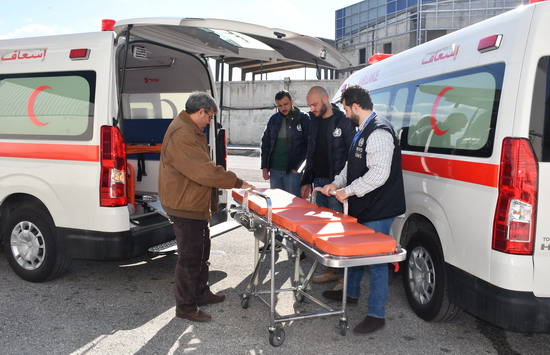
 17 February 2020 – WHO handed over 6 equipped ambulances to the Ministries of Health and Higher Education thanks to a generous donation from the Government of Japan. These ambulances are a vital boost to WHO’s efforts to support emergency and ambulance services with a view to improving the health outcomes of internally displaced people and local communities in south and northwest Syria, especially mothers and children, through reducing avoidable morbidity and mortality. In addition to the ambulances and as part of this same initiative, the Japanese Government is also providing 2 mobile clinics that will enhance the provision of primary health care services in the governorates of Aleppo and Al-Qunaitra.
17 February 2020 – WHO handed over 6 equipped ambulances to the Ministries of Health and Higher Education thanks to a generous donation from the Government of Japan. These ambulances are a vital boost to WHO’s efforts to support emergency and ambulance services with a view to improving the health outcomes of internally displaced people and local communities in south and northwest Syria, especially mothers and children, through reducing avoidable morbidity and mortality. In addition to the ambulances and as part of this same initiative, the Japanese Government is also providing 2 mobile clinics that will enhance the provision of primary health care services in the governorates of Aleppo and Al-Qunaitra.
Emergency medical situations require a prompt response and any delay can have serious consequences. The ambulances will strengthen the efforts of the 2 ministries to respond to the health needs of vulnerable people, especially in remote areas, as patients will be able to receive first aid support while on route to the nearest health facility.
“WHO’s priority is to support the Ministry of Health to prevent avoidable loss of life and further complications as a result of injury by providing immediate response and medical treatment to ensure the patients' survival,” said Dr Nima Abid, acting WHO Representative in Syria. “This new donation will be a major boost to enhancing emergency services provision in the country and will play a critical role in strengthening the referral system, a key aspect in the achievement of universal health coverage,” added Dr Abid.
While the 6 ambulances will strengthen the response to emergency and trauma cases and facilitate the referral of patients to hospitals, the 2 mobile clinics will provide primary health care services to rural areas in Aleppo and Al-Qunaitra where the number of returnees has significantly increased. On average, each mobile clinic can serve more than 3000 patients monthly. These include patients suffering from health problems, such as respiratory infections and chronic diseases, in addition to pregnant women and children in need of medical care.
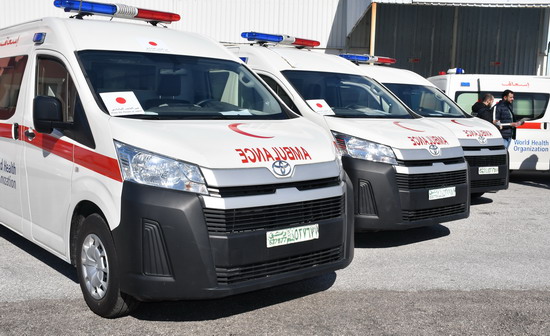 Based on the Health Resources and Service Availability Monitoring System at WHO (HeRAMS), the status of functionality of assessed public health facilities (hospitals and health centres) at the end of December 2019 was as follows:
Based on the Health Resources and Service Availability Monitoring System at WHO (HeRAMS), the status of functionality of assessed public health facilities (hospitals and health centres) at the end of December 2019 was as follows:
- Across Syria: Out of 1925 assessed public health facilities, 907 (47%) were reported fully functioning, 425 (22%) partially functioning, 593 (31%) non-functioning (completely out of service).
- Across Aleppo governorate: Out of 243 assessed public health facilities, 33 (14%) were reported fully functioning, 49 (20%) partially functioning, 161 (66%) non-functioning.
- Across Dar’a governorate: Out of 112 assessed public health facilities, 18 (16%) were reported fully functioning, 76 (68%) partially functioning, 18 (16%) non-functioning.
- Across Al-Qunaitra governorate: Out of 60 assessed public health facilities, 32 (53%) were reported fully functioning, 18 (30%) partially functioning, 10 (17%) non-functioning.
- Across Hama governorate: Out of 180 assessed public health facilities, 135 (75%) were reported fully functioning, 14 (8%) partially functioning, 31 (17%) non-functioning.





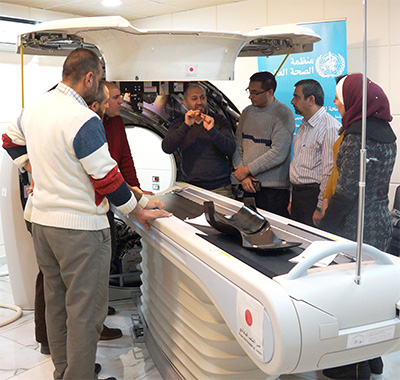 10 February 2020 – WHO welcomes the generous support from the Government of Japan to conducted training courses for Ministry of Health and Ministry of Higher Education engineers through the “ Training for All – (T4A)” project on acquiring the know-how in installing and maintaining lifesaving and state of-the-art medical equipment at health facilities inside Syria.
10 February 2020 – WHO welcomes the generous support from the Government of Japan to conducted training courses for Ministry of Health and Ministry of Higher Education engineers through the “ Training for All – (T4A)” project on acquiring the know-how in installing and maintaining lifesaving and state of-the-art medical equipment at health facilities inside Syria.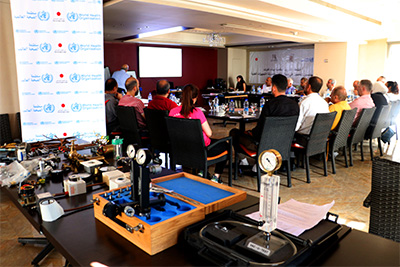 The T4A project consists of three phases and was first implemented in April 2017. The project was introduced in the governorates of Damascus, Homs, Aleppo, Daraa, Hama, As-Swieda, Lattakia, Tartous and Deir-ez-Zor. More than 625 medical engineers and technicians have been effectively trained on the use and maintenance of different types of X-rays, CT scan, catheterization, angiography and MRI machines, as well as endoscopy, ophthalmic and operation room equipment, and laboratory and physical therapy equipment. Phase III of the project was launched in April 2019, targeting 160 trainees.
The T4A project consists of three phases and was first implemented in April 2017. The project was introduced in the governorates of Damascus, Homs, Aleppo, Daraa, Hama, As-Swieda, Lattakia, Tartous and Deir-ez-Zor. More than 625 medical engineers and technicians have been effectively trained on the use and maintenance of different types of X-rays, CT scan, catheterization, angiography and MRI machines, as well as endoscopy, ophthalmic and operation room equipment, and laboratory and physical therapy equipment. Phase III of the project was launched in April 2019, targeting 160 trainees.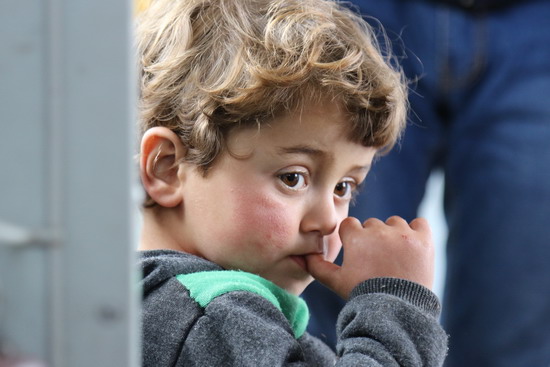 3 February 2020, Geneva-Cairo-Copenhagen – The World Health Organization raises alarm over critical health threats facing hundreds of thousands of Syrians forced to flee due to intensified hostilities in northwest Syria and attacks on health care.
3 February 2020, Geneva-Cairo-Copenhagen – The World Health Organization raises alarm over critical health threats facing hundreds of thousands of Syrians forced to flee due to intensified hostilities in northwest Syria and attacks on health care.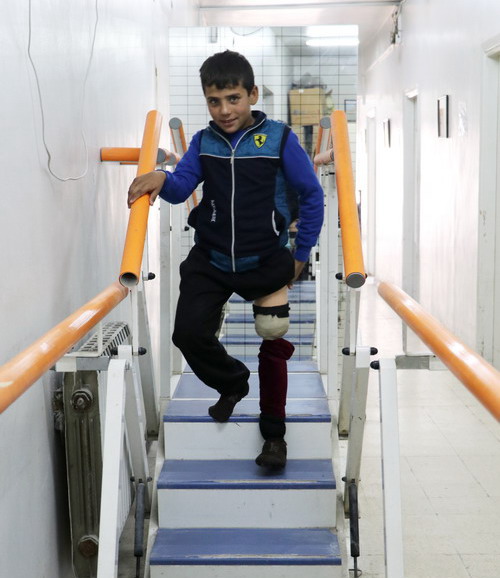 17 December 2019, Damascus, Syria – In the crowded reception area of the Disability and Physical Rehabilitation Centre in Damascus, 13-year old Ali from Ar-Raqqa governorate waits for his name to be called. His father Jaseem waits patiently with him, optimistic that his son will receive the best possible treatment. Ali was injured during a bombardment of his area of Ein Issa city in north-east Syria two years ago while helping his father in their small shop. Shrapnel hit his leg and he was rushed to hospital, where doctors had no choice but to amputate his leg above the knee. Since then, he has been fitted with a series of artificial left legs to accommodate his growing body.
17 December 2019, Damascus, Syria – In the crowded reception area of the Disability and Physical Rehabilitation Centre in Damascus, 13-year old Ali from Ar-Raqqa governorate waits for his name to be called. His father Jaseem waits patiently with him, optimistic that his son will receive the best possible treatment. Ali was injured during a bombardment of his area of Ein Issa city in north-east Syria two years ago while helping his father in their small shop. Shrapnel hit his leg and he was rushed to hospital, where doctors had no choice but to amputate his leg above the knee. Since then, he has been fitted with a series of artificial left legs to accommodate his growing body.